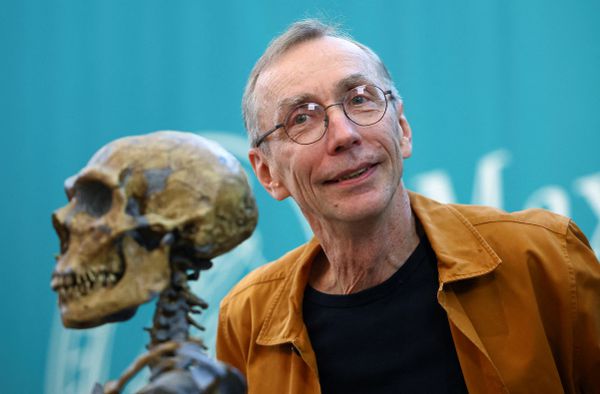He followed in his father's footsteps and won the Nobel: Who is Svante Paabo?
For the first time in history, a father and his son received the Nobel Prize. The Swedish Academy announced on October 3, 2022, that Swedish scientist Svante Paabo, just like his father Sune Bergstrom, has won the Nobel Prize in Medicine.

One of the most curious subjects of humanity is the origin of its own ancestry: Where did we come from, how did we come to be, were there any similar ones before us, if so, who were they, what were the kinship relations between us and them, why did they perish, or are there any living among us, how much does it matter to each other? we look alike, did we destroy them... Endless questions.
Scientists have largely answered these questions. The first steps were taken when archaeologists and ancient biographers in Africa, Europe and Asia found the bones of their close ancestors as a result of more than a century of "fossil hunting". Deep, multi-dimensional, multidisciplinary research, comparing skulls and other skeletal bones with today's humans, has revealed the differences. Yes, we had similarities, they were similar to us, almost like us, but they were separate from 'homo sapiens'.
DID WE DESTROY OUR Cousins?
Many of our close relatives were unearthed. Our closest relative was Neanderthal man. We had another relative: the Denisovan people.
Neanderthal man developed outside of Africa and spread to Europe and Western Asia. They lived between 400,000 and 30,000 years ago.
Homo sapiens, that is, we arose in Africa, 300,000 years ago. It came out of Africa 70,000 years ago and migrated to the Middle East, where it spread through Anatolian roads to Europe and Asia. (Today we have invaded the earth.)
In other words, we shared a similar geography with the Neanderthal lineage for an average of 40 thousand years.
DEFENDING HIS LIFE TO THIS
A young man, Swedish-born Svante Pääbo, while still a doctoral student, pursued the question of who these Neanderthals and their relation to us.
You could say he spent his life on it.
He extracted his genome, or genetic makeup, from the bones of extinct Neanderthals (2010). It was the product of an extraordinary work that took decades. For this, he developed new analysis methods.
He compared the genetic makeup of us and Neanderthals: we mingled, we were together, we had children...
Today, there are 1-4 percent Neanderthals in the genome of modern humans living in various geographies!
Then he made another great discovery: our cousin Denisova in a cave in Siberia! DNA analysis from 40,000-year-old finger bones showed that Denisovans were different from Neanderthals and us.
There was also gene exchange between Denisovans and Homo sapiens living in Southeast Asia. Denisova origin in the genome of people in these regions was up to 6 percent.
WE ARE THE MOST INVESTATIVE SPECIES
The Nobel Prize committee says: "Thanks to Svante Pääbo's discoveries, we now understand that archaic gene sequences from our extinct relatives influenced the physiology of modern humans. For example, it is the Denisova version of the EPAS1 gene that confers a high-altitude survival advantage and is common among Tibetans today. Our immune response to different types of infections is due to Neanderthal genes.”
Our scientist, who won the Nobel prize alone, established the discipline of "paleogenomics" as a result of all these studies. So now the discipline that studies the genes of our deceased cousins.
Why and how Neanderthals and Denisovans perished, and how and why homo sapiens remained alone on earth, the wars and unions between them is a completely different adventure.
Undoubtedly, differences in intelligence, skill, and ability have made us the most invasive species.
Where Homo sapiens evolved and whether a superior species will emerge in the coming centuries constitutes the speculative aspect of science and offers plenty of scenarios for science fiction.
Without waiting for evolution, today science is moving towards creating new human types by playing with the human genome as it wishes! At the same time, we are trying to create artificial intelligence people!
Father and son
A father and son have been awarded the Nobel Prize before, but they have not received the same award. Arthur Kornberg, who won the Nobel Prize in 1959, received the award in medicine, while his son Roger Kornberg was awarded the Nobel Prize in Chemistry in 2006 for his research on the processes by which cells produce proteins from genes.
Besides fathers and sons, there are other families who have been awarded the Nobel Prize. Norwegian couple May-Britt Moser and Edvard Moser were awarded the Nobel Prize in Medicine in 2014, along with Professor John O'Keefe of the USA.
The wife of Marie Curie, who won the Nobel Prize in Physics in 1903, was awarded the Nobel Prize in Chemistry in 1911. Marie Curie is also known as the first woman to win the Nobel Prize.
The Curie family continued their success when their daughter Irene Curie and her husband Frederick were awarded the 1935 Nobel Prize in Chemistry.
